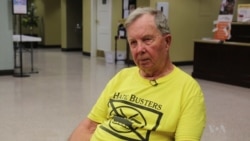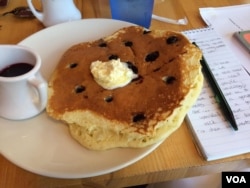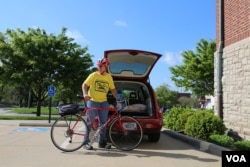Dr. Ed Chasteen of Liberty, Missouri, gets to his “office” – the first table in a local diner – at 6:30 a.m. every weekday.
“My wife doesn’t like me meeting people in the house,” he said, sitting at a high table at Ginger Sue’s, surrounded by stacks of pancakes and paper.
Chasteen is the founder of HateBusters, a group that reaches out to victims of hate crimes or discrimination within a 160-kilometer radius of his town, a suburb of Kansas City, Missouri.
“We help people who’ve been hurt because somebody hates them – hate their religion or their race, and we call ‘em up and find out what they need and whatever it is, we do it,” he said.
Chasteen says his group raises money, goes to court, holds prayer meetings, “whatever they need – they tell us, we get it.”
Most recently, Chasteen responded to reports of a man beating on the door of an interracial couple late at night screaming, “We’re gonna kill your n*** kids and you.”
“We went there. They needed support,” Chasteen recounted.
Chasteen later organized a community event at the local school to show support for the family and to get local media attention. Afterwards, Chasteen says the perpetrator spoke with the police and the family and agreed to leave town.
Rejecting hate
Chasteen started HateBusters in 1988, a take off the name of the popular 1984 movie, “Ghostbusters.” He was a professor at William Jewell College at the time and formed the group with some of his students. Former KKK grand wizard David Duke had just been elected as a U.S. representative of the southern state of Louisiana.
But he had developed strong feelings about discrimination long before that. When he was 14, growing up in east Texas, he remembers a sermon his preacher delivered about loving everyone in your community.
“So I thought, wow, everybody in Huntsville is going to love everybody in the morning. I thought that for about 30 seconds.”
As he was leaving the church, he passed two deacons who said they would beat back “with a baseball bat” any African-Americans, using a derogatory term, who tried to come to their church.
“I never could forget what they said,” Chasteen said.
Kindness of others
Chasteen so deeply believed in the inherent goodness of people that in 1987, just before he started HateBusters, he decided to ride his bike across the entire country – from Disney World in Florida to Disneyland in California – with no money.
“I thought if I can do that without money by myself asking for a glass of water, a sandwich, bed for the night, and if people are good like I think they are, they’ll say, ‘yes,’ and I’ll make it. If they’re not as good as I think they are, I won’t make it. Either way I’ll learn something,” he said.
“But I made it – no one ever said no. Over 500 people I asked, no one ever said no.”
Among the many reasons he took this trip was a personal one – shortly before he been diagnosed with multiple sclerosis (MS) and told he could not be physically active or get overheated without risking becoming an invalid.
“I couldn’t live that way, so I started riding,” he said. “That’s why I rode across the country. And now, the more I ride, the better I feel.”
At 81 and retired, Ed Chasteen still rides his bike daily, going as far as 80 kilometers (50 miles) on weekly Saturday rides with a group called the Greater Liberty Riders.
Biking plays a role in HateBusters as well. Due to his MS, Chasteen has trouble walking, so bike rides have taken the place of marches for the group.
‘The ideals will live’
Though the group’s focus now is local, HateBusters activists have traveled and spoken across the United States, including at a conference on hate crimes at the White House under president Bill Clinton in 1997.
Since then, the focus of the group and its role in the community have fluctuated.
“It certainly is urgent today,” Chasteen said, citing statistics from the Southern Poverty Law Center which has noted a significant surge in the number of hate groups in the United States over the past year.
Though he voiced disapproval of President Donald Trump, whom he refers to as the “current occupant” of the White House, Chasteen is confident in the mission of his organization, and the general kindness of people, to overcome hateful rhetoric from any source.
“What we do is bigger than any one person and bigger than any one cause,” he said.
“The ideals will live in the lives and dreams and hopes and deeds of lots of people.”













